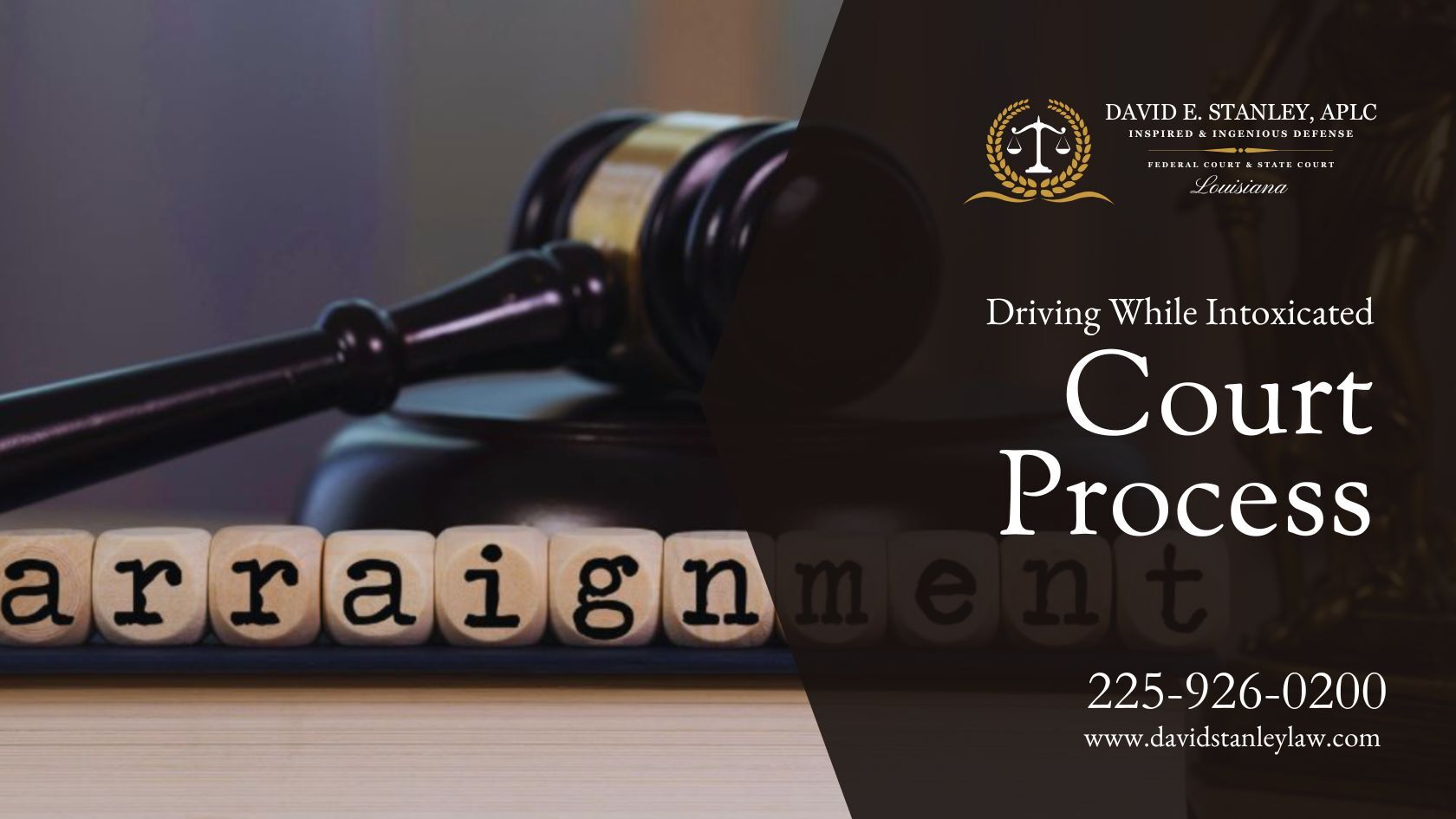Baton Rouge, LA Court Process for DWI
Table of Contents
ToggleFacing a DWI charge in Louisiana comes with serious legal consequences, including fines, license suspension, mandatory education programs, and possible jail time. It can also affect employment, insurance rates, and personal reputation. Given the complexity of Louisiana’s DWI laws, having an experienced defense lawyer is essential. A skilled attorney can evaluate the case, identify possible defenses, and work to reduce penalties or seek dismissal. Legal representation is key to protecting your rights and navigating this challenging process with confidence.

David E. Stanley, APLC, provides more than just legal representation. He is a guide through the court process for DWI charges in Louisiana, enabling clients to understand each step and be prepared for what’s to come. With the help of an experienced lawyer like David E. Stanley, APLC, the process of comprehending the legal system becomes easier to handle. David E. Stanley, APLC, works hard to defend clients’ rights and seek favorable outcomes, from analyzing the evidence to negotiating with prosecutors. People facing DWI accusations can move through the court system with clarity and confidence if they have a solid defense plan, empowering them in a challenging situation. Don’t face a DWI charge alone. Schedule a consultation with David E. Stanley, APLC, today to protect your rights.
DWI Court Process After an Arrest in Louisiana
Arrest
An arrest is the first step in the court process for a DWI case. With the exception of checkpoint situations, law enforcement officials must have good reason to suspect a traffic infraction has occurred before conducting a traffic stop. An arrest may occur when a police officer observes a traffic violation, stops the motorist for the traffic violation and observes indications of intoxication or smells alcohol. One of the first consequences of a DWI arrest is the suspension of your driver’s license. Since the legal defense process begins immediately after an arrest, contacting a DWI defense lawyer quickly is crucial. You can take proactive measures to safeguard your driving privileges, legal rights, and future.
Administrative Hearing
If you are arrested for DWI and your license is seized, you must act quickly to prevent its suspension. To challenge the suspension, you have 30 days to request an administrative hearing. During this time, you will receive a temporary license to continue driving while your case is under consideration. Your lawyer should request this hearing to fully protect your driving privileges. If you do not hire a lawyer within 30 days after your arrest, you should make sure that you make a written request for the administrative hearing on the form given to you at the time of your arrest that is postmarked within 30 days of the date of your arrest.

Arraignment
After you bond has been set, an arraignment is the first court appearance in a DWI case. The date may be listed on your ticket, or you may receive a formal notice later. At your arraignment, the court will read your charge to you and you will be asked to enter a plea of not guilty, guilty, or no contest (nolo contendere). An experienced DWI defense attorney will guide you through your plea options and build a strong strategy to protect your rights.
The timing of an arraignment can vary. Regardless of when it takes place, the plea you enter carries significant legal consequences. Having an experienced DWI defense attorney by your side is crucial, as they can explain the potential outcomes of each plea and develop a favorable strategy for your case. In order to preserve your rights and reduce penalties, your lawyer will evaluate the facts of your arrest and decide on a favorable course of action.
Pretrial
A crucial step in preparing your defense is the pretrial process. This phase includes investigation, evidence review, pretrial motions, and plea negotiations, all of which significantly impact the case outcome. A competent DWI defense attorney will submit motions to suppress any illegally obtained evidence, contest the prosecution’s evidence, and, if warranted, file a motion to quash, which seeks to have the case dismissed.
Motion Hearings
Motion hearings play a key role in DWI cases, allowing attorneys to challenge aspects of the case that may influence the outcome. The motions filed depend on the case details and may include suppressing unlawfully obtained evidence, quashing charges due to legal defects, or questioning the legality of the traffic stop.
A skilled Louisiana DWI attorney can identify motions that weaken the prosecution’s case. A successful motion can reduce charges, suppress evidence, or even result in case dismissal. These hearings are crucial for strengthening the defense, making skilled legal representation essential.
Trial
The trial process in a DWI case varies based on whether the charge is a misdemeanor or a felony. Misdemeanor cases go to a bench trial, where a judge determines the verdict. Felony cases allow the defendant to choose between a jury or bench trial, with the decision made prior to trial.
During the trial, both sides present evidence, witness testimony, and legal arguments. The prosecution must prove guilt beyond a reasonable doubt, while the defense challenges the evidence and builds a case for acquittal. A well-prepared defense strategy can significantly influence the outcome.
Sentencing
When a defendant pleads guilty, or is found guilty after a trial, the court moves to sentencing. Several factors influence the decision, including the defendant’s prior record, case details, and Louisiana’s legal guidelines. In some cases, the court may conduct a pre-sentence investigation to assess the defendant’s background, employment, and personal history.
Penalties for DWI offenses vary and may include fines, license suspension, probation, alcohol education programs, community service, or jail time. Repeated offenses or high BAC levels often lead to stricter sentences. A skilled DWI defense attorney can advocate for reduced penalties and explore alternative options, such as diversion programs or probation, to lessen long-term consequences.
Frequently Asked Questions
How Long Does the DWI Court Process Take in Louisiana?
The DWI court process in Louisiana varies depending on whether the case goes to trial or a plea is entered, but typically cases typically take 4 – 12 months, but can last over a year in felony DWI cases. After an arrest, the arraignment occurs within 4 – 8 weeks, followed by pre-trial motions and hearings that may take months. If a plea deal is reached, the process ends sooner. A trial, if necessary, may extend the timeline further. Factors like severity of the charges, whether an automobile accident occurred, case complexity, court backlog, and legal strategy impact the duration. First-time offenders may resolve cases faster, while repeat offenses or contested cases take longer.
What Are Possible Defenses Against a DWI Charge?
Some of the possible defenses against a DWI charge include lack of probable cause for the traffic stop, improper administration of field sobriety or breathalyzer tests, medical conditions affecting test results, and rising blood alcohol levels. Errors in police procedures, faulty breathalyzer calibration, or violations of constitutional rights can also be challenged. Witness testimony and video evidence may contradict the officer’s claims. An experienced attorney can analyze these factors to seek case dismissal, reduced charges, or alternative sentencing options.
DWI Lawyer in Baton Rouge, LA

Facing a DWI charge in Louisiana? Take action now to protect your rights. David E. Stanley, APLC, provides legal defense and guidance through the court process. With a strong track record, he is ready to assist you. Call today for legal support.
David E. Stanley, APLC
1055 Laurel Street, Suite 2 Baton Rouge, LA 70802
225-926-0200


